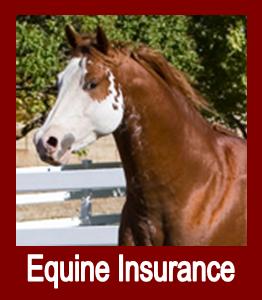 The equine insurance industry is quite different from the insurance industry in the medical, i.e. human, field. Insuring your horse is a matter you need to consider very carefully. In most instances the premium is based on a percentage of the value of your horse with age, breed, and discipline playing a role in determining the premium.
The equine insurance industry is quite different from the insurance industry in the medical, i.e. human, field. Insuring your horse is a matter you need to consider very carefully. In most instances the premium is based on a percentage of the value of your horse with age, breed, and discipline playing a role in determining the premium.
It is important that you be aware that you must be able to document and provide a detailed explanation for the value that you identify on your policy. The purchase price, winnings and offspring can all be a part of documenting this value. In some instances, when a claim is made, the owner is required to provide proof documenting the value of their horse and you would want to have this information prepared ahead of time.
Further, it is important for you to know how mortality policies are written and what your responsibilities are as an owner.
For example, these policies may require you to do everything medically that can be done to save your horse. This may then require you to consent to surgery, in the case of colic, to satisfy your policy for coverage. In the case of colic surgery the costs of surgery may well exceed what your policy will cover. You will want to talk with your insurance agent to discuss these conditions. Non-disclosure of an injury and or illness can also be grounds for claims being denied. Most policies clearly outline that it is the owner’s responsibility to make contact with the insurance company and outline the details of any medical problem promptly.
Policies can be purchased for mortality only, surgical and/or major medical and loss of use. The latter of these is the most stringent in requirements and expenses. Often x-rays are required in addition to an in-depth examination to document the patient’s status at the time the loss of use policy is applied for. In some instances these x-rays must be repeated as a condition of extension at the end of the policy year. Again, it’s important that you discuss this matter at length with your agent in hopes that misunderstandings can be avoided.
There are other ways in which equine insurance differs fundamentally from human insurance. If your horse develops a medical problem or ends up having colic surgery during the course of a policy year, often this condition will be excluded at the time of renewal. In the medical field you wouldn’t normally be cancelled for problems you develop while insured as long as you take care and don’t let your policy lapse, but this doesn’t apply to equine insurance. A second issue involves payment for medical expenses. In the medical field the doctor’s office or hospital usually handles most of the paperwork and is reimbursed directly from the insurance company. In the veterinary field, most equine practices require the owners to satisfy the bill before patients are discharged and the insurance company then later reimburses them.
In the event that your horse needs to be hospitalized, be prepared to provide us with a list of information. We will need your agents contact number as well as the name of the company insuring the horse and their emergency or after-hours phone number. We normally need permission to provide surgical care for a patient and therefore it is important that you have this information readily available so as to avoid costly delays. Insurance can be of tremendous value in providing piece of mind and a little advanced preparation can be very helpful in the middle of night when that fateful emergency will most likely present itself.